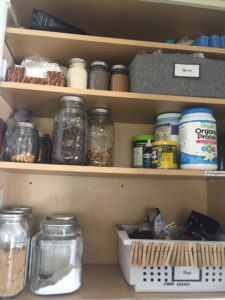
For those who know me well…it’s a little eerie.
Since the beginning of the year here at Casa de la Breitenstein, I’ve been heading up my own ambitious, highly uncharacteristic Project Ducks in a Row.
Which is to say, I–the creative, the mess-blind–have undertaken to organize this house.
If you suggested it was a coping mechanism, you would be correct. Namely, this is an effort to get some control in what I can control while raising teenagers, blessed be their ornery hearts.
It’s also my husband’s and my mutual effort to press into simplicity. I am getting to know all the Goodwill drop-off folks by name.
As I am pitching things and decanting others and relentlessly whipping this place into shape, I’ve thought about how I wished for this when my kids were little–to be a smooth-operating machine with cupboards that make me happy (see example).

And then I think, Janel, in that season you could hardly get a shower on your own or manage to brush your teeth without some short person dumping something with a lot of pieces. It would have been great for you to be organized.
It would also be great to own a pair of solid gold pants. But here we are.
Rinse. Repeat
Then even more than now (where I spent an hour this morning mopping up snow tracks from my laminate, and befriending my slow cooker), life was chockfull of the mundane.
And finding joy in that mundane felt hard.
I was wiping, well, pretty much everything. I would clean up Lego shrapnel only to skewer the pads of my feet 13 minutes later on six more. I was loading and unloading and loading and unloading the dishwasher. I filled well over 3,000 sippy cups. (Think about it.) I folded laundry slower than we could wear it.
Rinse. Repeat.
On some days, my life just felt small.
Because my life felt like a 24-hour Bounty commercial, I asked God a lot of questions, scrabbling for joy in the mundane.
I’d been willing to go anywhere for him. And he chose suburbia complete with the picket fence and the dog? For reals?
I had a lot to learn about my motivations for a big life. I know we’re told to dream big for God. But I had to come to the realization that when I told God I’d go anywhere for him, I kind of meant anywhere sexy.
My me-centered cravings had, in some sly ways, gotten a little religious lipstick. (Which was a whole lot more lipstick than I was wearing in my yoga-pants life.)
So here’s what I’ve learned as I comb through the monotony, panning for joy in the mundane.
Your mundane makes the space for gratitude.
Gratitude: It’s one of the ways sweeping my floor (which yes, occasionally has been known to happen) or mopping up kid-puddles from the shower becomes more beautiful.
First, it’s a chance to thank God for a lot of the gifts I enjoy that my friends in Africa can’t. (Don’t miss 31 Things to Be Thankful for Today If You Live in the Developed World.)
I have running water. I have a mop, rather than using a cloth on my hands and knees. I have a dishwasher which, after 5.5 years of handwashing, I could kiss on the mouth. I have food to feed my occasionally slovenly children.
But like a camera lens, I also get to choose what my mind zooms in on: “The eye is the lamp of the body. So, if your eye is healthy, your whole body will be full of light” (Matthew 6:22).
I mentioned that in my son’s cancer scare, my son helped us all by zoning in on the gratitude. Because gratitude tips my eyes upward. It helps me see the gifts God is piling around me right and left.
And it looks a whole lot like happiness I choose.
The mundane hands me time to be with God.
Though I’m reticent to admit this, I usually find myself tidying something when I wake up in the morning, because it a) gives me some fulfillment to get my world in order to start my day and b) can be done with minimal brain energy, which allows me to pray and think and be thankful.
Finding joy in the mundane means…training my eyes to see God there.
You may have heard of the monk, Brother Lawrence, assigned the task of (hey!) washing dishes. He once wrote,
O Lord of pots and pans and things,
Since I have no time to be
a great saint by doing lovely things…
Make me a saint by getting meals,
and washing up the plates.
About Lawrence, it’s written,
[Brother Lawrence] said that our sanctification does not depend as much on changing our activities as it does on doing them for God rather than for ourselves.The most effective way Brother Lawrence had for communicating with God was to simply do his ordinary work. He did this obediently, out of a pure love of God, purifying it as much as was humanly possible. He believed it was a serious mistake to think of our prayer time as being different from any other. Our actions should unite us with God when we are involved in our daily activities, just as our prayers unite us with him in our quiet devotions. (Practicing the Presence of God, 24)
The mundane is where we meet God even when we’re not expecting it.
Mary probably wasn’t expecting an angel when he appeared to her. The woman at the well wasn’t expecting to meet God at the town well.
But God loves to intersect daily life.
Finding joy in the mundane = remembering God values the hidden, and the value of a particular life.
God seems to have this love for the quiet life (1 Thessalonians 4:11), the hidden.
He likes the Davids before they become king, slinging rocks at a target out in a remote pasture.
He sees the woman trying to avoid notice in the crowd (Luke 8:47).
He likes the left hand that doesn’t know the right hand (Matthew 6:3).
He likes the one who serves the servant (Mark 9:35).
There’s something that warms me about Jesus taking one of only nine sentences recorded from the Cross, asking John–the Son of Thunder–to care for his mom. Because of all the things John could do (writing Scripture, going to the ends of the earth, etc.), serving that one woman on Planet Earth mattered deeply to Jesus.
Author Kyle Idleman speaks of a couple in 1956 who visited another couple to tell them about Jesus. In the couple they visited, the man was struggling with alcoholism. That man was in a desperate place…and would be Kyle’s grandfather. Kyle, here in 2022, pastors a church that seats 9,000–not something that evangelizing couple could have known in 1956. But their act of obedience–maybe on a cold night when they could have been curled up watching TV–mattered for generations to come.
Joy in the Mundane: This is God Loving Your Family
But even if you’re not evangelizing, you loving on your family is part of how God loves on your family.
Martin Luther famously wrote, “God is milking the cows through the vocation of the milkmaids.”
That means God’s loving your kids by giving them clean, folded-ish clothes and listening to meandering stories about their time on the playground.
He loves your spouse through you making the bed or choosing graciously head off an argument.
He loves your family when your vacuum sucks the mashed Cheerios from the car seats because you just can’t take it anymore.
Just like your obedience right now, in the stultifying mundane, matters in ways you can’t see.
Homemaking wraps us tenderly even when we’re not at home. Through our senses, homemaking shores us up with the message, “You are loved. Your experience at home matters.”
Our families, through our homes and homemaking, glimpse God. (If you’re curious about this idea, check out Why Homemaking Is More Than Scrubbed Toilets.)
As Courtney Reissig has written,
The pattern of scripture is lose yourself and you will find yourself (Matt. 10:39
). Smallness equals greatness. Faithfulness is success.
And really, finding joy in the mundane, we follow a Jesus who washed feet and cooked fish and healed gross health issues and made sure people got fed.
We model a Jesus who made himself a servant so we could experience the beauty of real love.
Like this post? You might like
A Christian Home: Wondering Where to Start?
For the Day When You’re Done with a Small Life
An Open Letter: When You’re Tired of Doing the Right Thing
An Open Letter to a Mom of Young Kids








